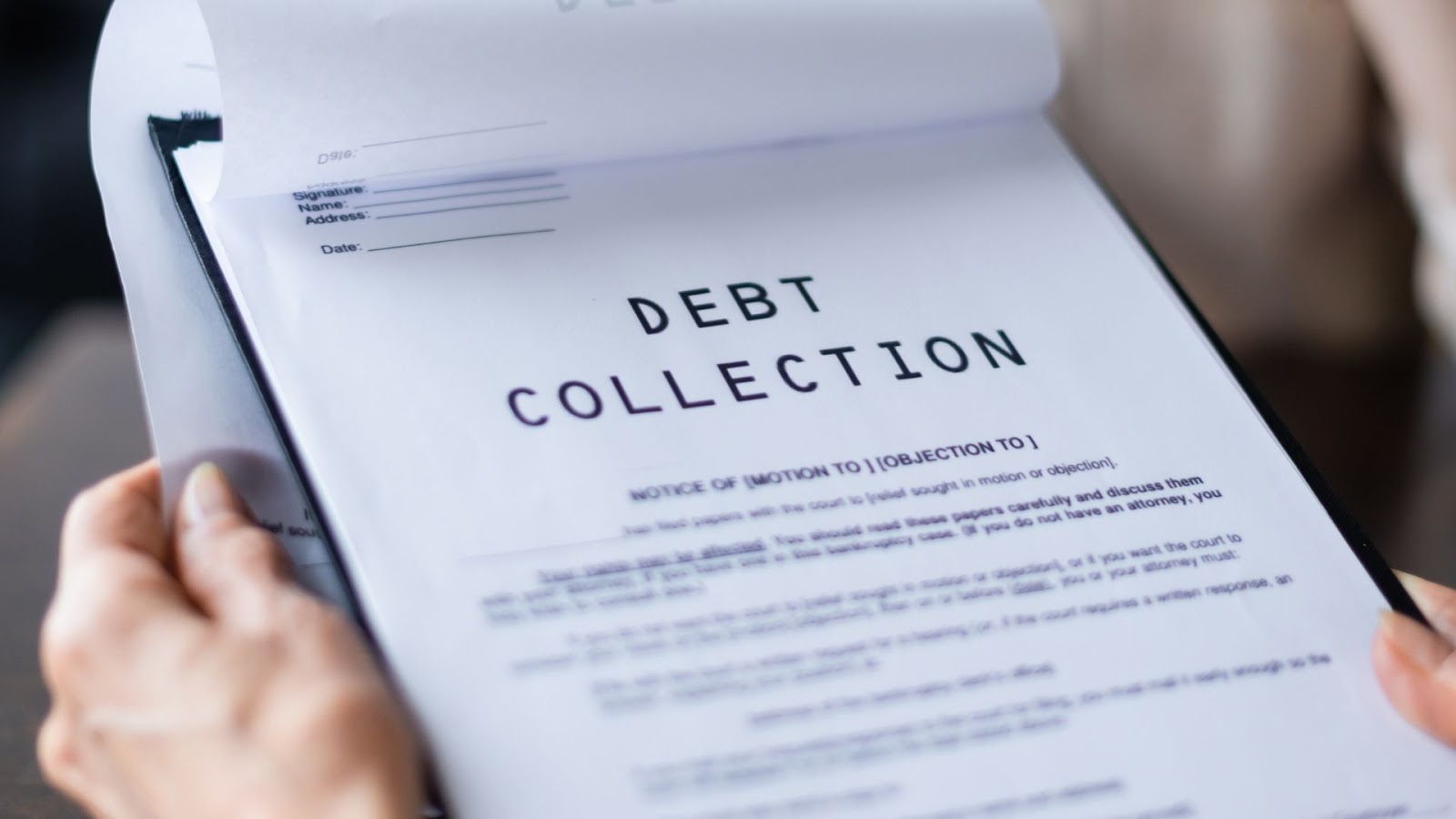
Debt collection is a complex process that involves more than just recovering overdue payments. One of the key questions many businesses face is whether they can charge interest on outstanding debts.
The answer depends on the terms set out in the original credit or loan agreement, as well as specific laws that regulate what collectors can and cannot charge. According to the Consumer Financial Protection Bureau (CFPB), in 2024, 109,900 debt collection complaints were filed, involving disputes over unexpected interest charges on existing debts.
For businesses, understanding the legal system around interest charges is crucial not only for compliance but also for maintaining transparent relationships with clients and customers. This blog will explore the legalities surrounding interest on debts, what businesses need to know, and how they can address this complex area of debt recovery.

When a debt goes unpaid, the balance doesn’t simply stay the same; it grows. Interest charges, along with additional fees, can quickly increase the total amount owed, making it harder for both businesses and individuals to resolve the outstanding balance.
Interest on unpaid debts starts accruing the moment a payment is missed or the due date passes. Depending on the terms of the original agreement, interest can be calculated either daily or monthly. Daily interest leads to small increases in the debt each day, while monthly interest results in larger increases at the end of the billing cycle.
Many debts apply compound interest, meaning the interest is calculated not just on the original debt but also on any interest that has already been added. This can cause the debt to escalate quickly, as interest is added to both the principal amount and the previously accumulated interest.
For example, if a $1,000 debt has a 20% interest rate compounded annually, after one year, the debtor will owe $1,200. The following year, interest is calculated on the new total, which makes the debt grow even faster.
In addition to interest, many creditors impose late fees or penalty charges when payments are missed. These charges, in combination with interest, can cause the debt to balloon quickly.
For example, if a consumer misses a payment on a credit card, they might be charged a $35 late fee on top of the interest accruing on the balance.
Re-aging is a practice where a debt that is overdue is brought back to a “current” status after the debtor makes a payment arrangement. While this can help a consumer’s credit report, it also resets the clock on interest.
As a result, interest continues to accumulate on the debt, even if the consumer has made an attempt to bring the account up to date. For businesses, this means the amount owed may continue to grow, prolonging the recovery process.
Some loans and credit agreements include grace periods, which give the debtor additional time to make a payment without incurring penalties. However, once the grace period ends, interest and late fees may be applied retroactively.
For example, a loan might allow for a 30-day grace period after the payment due date before charging any interest, but once that period ends, interest is applied to the entire balance, which can increase the total owed.
Debt collectors follow the terms of the original loan agreement when collecting debts, including any provisions for interest charges. If the original agreement specifies that interest can be charged on the overdue debt, collectors can continue to add interest throughout the recovery process.
However, the Fair Debt Collection Practices Act (FDCPA) ensures that debt collectors cannot charge interest or fees that were not included in the original agreement.
To mitigate these risks, businesses should establish clear collection protocols, provide proper training, and seek legal advice when needed to ensure they follow the rules.
Also Read: How to Delegate Debt Collection to Experts and Improve Cash Flow
While the general principles of interest accumulation are the same, different types of debt operate under distinct rules. For instance, the interest rates on Credit cards and medical bills have other characteristics that influence the calculation and how it is applied during collection efforts.

Certain types of debt have unique rules when it comes to accruing interest, and understanding these differences can help both businesses and consumers manage payments effectively. Debt collectors must follow the terms set out in the original agreement, and they are limited in how they can apply or adjust interest rates.
The complexity of various debt types and their interest structures highlights the critical need for regulatory oversight in the collection industry. Without proper legal boundaries, the potential for abuse in interest charging would leave consumers vulnerable to predatory practices.

The Fair Debt Collection Practices Act (FDCPA) is a federal law that sets clear rules for how debt collectors can operate when trying to recover unpaid debts. Its main goal is to protect consumers from unfair, deceptive, or abusive practices, while also providing businesses with a legal framework to recover debts responsibly.
For debt collectors, the FDCPA establishes strict boundaries around the charges they can apply to a debt. It ensures that collectors cannot add unauthorized fees or interest beyond what was agreed upon in the original loan or credit contract.
Key aspects of the FDCPA relevant to interest and debt charges include:
While the FDCPA provides the general legal framework that governs debt collection practices, understanding its practical application requires a closer examination. The Act's broad protections against unfair practices appear through detailed conditions that debt collectors must adhere to when applying interest charges.

Some key conditions and restrictions govern interest charges on debts in collections. These rules protect consumers from abusive practices and guide businesses in applying interest correctly and fairly. Here’s a breakdown of the most important conditions and restrictions businesses must follow when applying interest charges on debts.
Debt collectors are permitted to charge interest only if the original loan or credit agreement explicitly allows for it. This means that any interest charged during the collection process must align with the terms set forth in the initial contract between the creditor and the debtor.
For instance, if the original agreement specifies a 15% annual interest rate on overdue balances, the debt collector can apply this rate but cannot increase it beyond what was originally agreed upon.
Each state has its own set of usury laws that cap the maximum interest rate that can be charged on debts. Debt collectors must be aware of and comply with these state-specific regulations to avoid charging interest rates that exceed legal limits.
For example, if a state law caps interest rates at 10% annually, a debt collector cannot charge more than this rate, even if the original agreement allowed for a higher rate.
Debt collectors must clearly disclose the amount of the debt, including any interest or fees, in their communications with the debtor. This ensures transparency and allows the debtor to understand the total amount owed. Failure to provide such disclosures can lead to legal consequences for the debt collector.
Debt collectors are strictly limited in adding arbitrary fees that were not part of the original agreement. For example, collectors cannot add handling fees, service fees, or collection fees unless the original credit agreement explicitly permits them. These fees must be aligned with the terms of the agreement.
Consumers have the right to dispute any interest charges they believe are unauthorized or incorrect. If a debt collector continues to pursue disputed interest charges without proper validation, they may be in violation of the FDCPA, and consumers can seek legal recourse.
When debt collectors overstep these clearly defined boundaries, consumers aren't left without recourse. The legal system provides specific pathways for challenging improper charges, but success often depends on following precise procedures within tight timeframes.

Suppose you've encountered unauthorized debt collection charges, whether due to fraud, mistaken identity, or clerical errors. It's important to act swiftly and systematically. Here's a step-by-step guide to help you dispute these charges correctly:
Within five days of initial contact, a legitimate debt collector is required to send you a written notice detailing:
If you haven't received this information, request it in writing.
If you believe the debt is not yours, send a written dispute letter to the debt collector within 30 days of receiving the validation notice. Ensure your letter includes:
Send this letter via certified mail with a return receipt requested to have a record of the dispute.
If you suspect identity theft, contact one of the major credit bureaus (Equifax, Experian, or TransUnion) to place a fraud alert on your credit report. This alert warns creditors to take extra steps to verify your identity before extending credit in your name.
If the debt collector fails to provide validation or continues collection efforts after your dispute, file a complaint with:
These agencies can investigate and take action against unlawful debt collection practices.
Regularly review your credit reports for any inaccuracies or unauthorized entries. You can obtain free reports annually from AnnualCreditReport.com. Dispute any incorrect information directly with the credit bureaus.
Under the Fair Debt Collection Practices Act (FDCPA), debt collectors are prohibited from harassing, misrepresenting the amount owed, contacting you at inconvenient times or places, or discussing your debt with others without your consent. If you believe a debt collector has violated these rights, you may have grounds to take legal action.
When initial disputes fail to resolve violations or when collectors persist in illegal behavior, more robust legal remedies become necessary.

If you are facing excessive charges from a debt collector, there are several legal remedies available to protect your rights and ensure that debt collectors comply with the law:
Under the Fair Debt Collection Practices Act (FDCPA), you have the right to sue a debt collector in state or federal court if they violate any of its provisions. Common violations include charging unauthorized interest or fees, or engaging in harassment or misrepresentation.
Potential remedies include:
Note: Lawsuits must be filed within one year of the date of the violation.
If you believe a debt collector is charging interest or fees that violate the original contract or state laws, you can seek court intervention. The court can rule on whether the charges are illegal, order them to be stopped, and potentially award damages.
If a debt collector imposes illegal fees (e.g., excessive collection fees not agreed to in the original contract), you have the right to dispute them in court. This can lead to the refund of any wrongful fees and penalties for the collector.
Bankruptcy can stop interest accumulation on certain types of debts and may help eliminate debts entirely. However, it should be viewed as a last resort after exploring other legal options like repayment plans or negotiating with creditors.
While legal action can address violations after they occur, proactive debt management offers a more favorable approach to controlling interest costs. Rather than fighting excessive charges in court, strategic financial planning can prevent many interest-related problems from developing in the first place.
Implementing effective strategies to manage debt interest can reduce the amount you pay over time, shorten the repayment period, and help you regain control of your finances. Here are some key strategies to consider:
Also Read: How a Debt Management Platform Can Simplify Debt Repayment and Enhance Financial Control
Effective debt management requires expertise, whether you're a consumer seeking to minimize interest costs or a business pursuing ethical collection practices.
South East Client Services Inc. (SECS) is a trusted partner for businesses seeking professional debt collection services. With over a decade of experience, SECS specializes in managing and servicing delinquent accounts receivable, offering tailored solutions that adhere to legal and ethical standards.
SECS offers a suite of services designed to maximize recovery while minimizing risk:
In debt collection, managing interest charges is a delicate balance. Businesses must adhere to the terms of the original loan agreement and comply with state and federal regulations, such as the FDCPA, to avoid legal complications. Interest accumulation on unpaid debts can quickly grow, affecting both businesses and consumers.
From compound interest and late fees to state usury laws, understanding how these charges apply is crucial. Legal recourse, such as suing for FDCPA violations or disputing unauthorized fees, is available to ensure fairness in the collection process. Additionally, strategic debt management, such as negotiating with creditors or using structured repayment plans, can mitigate the financial burden.
For businesses seeking reliable, compliant debt collection services, South East Client Services Inc. (SECS) offers expert solutions to maximize recovery while maintaining transparency and fairness. Contact SECS today to ensure ethical and effective debt recovery for your business.
The 7 7 7 rule in debt collections refers to a timeline strategy. After 7 days of non-payment, the creditor will typically send the first notice. After 7 more days, a second notice is sent, and after 7 more days, the debt might be escalated to a collection agency. This rule is aimed at ensuring timely follow-ups and creating urgency for debtors.
When all debt is forgiven, it’s called a debt discharge or debt cancellation. This often occurs in legal settings, such as through bankruptcy, where a court determines that the debtor no longer has to pay the outstanding amount, either in full or partially.
The three main types of debt are secured debt, unsecured debt, and revolving debt. Secured debt is backed by collateral (e.g., a mortgage), unsecured debt is not tied to any asset (e.g., credit card debt), and revolving debt refers to credit lines that can be used repeatedly (e.g., credit cards, home equity lines of credit).
Banks may forgive debt in certain circumstances, such as through debt settlement or bankruptcy proceedings. However, they generally prefer to recover debts through collections or restructuring. Debt forgiveness typically comes with tax implications for the debtor.5.
The highest form of debt is typically secured debt, particularly in cases involving substantial assets such as real estate or large loans. Secured debt is considered high because it is backed by valuable assets, and lenders have more leverage to reclaim these assets if payments are not made.